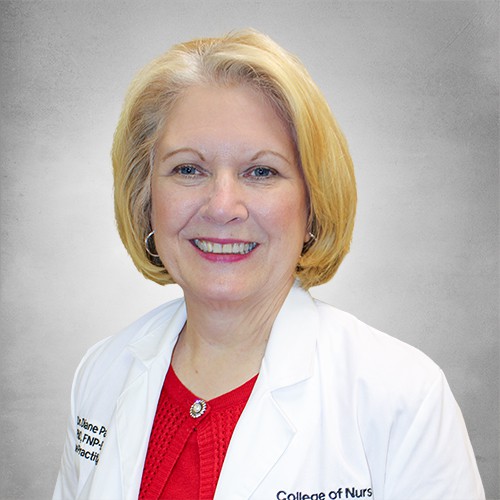COVID-19 has created challenges for health care professionals as they try to serve their patients while adhering to social distancing guidelines.
For Regional One Health’s Transitioning Through Menopause support group, that meant turning to virtual meetings. Certified Menopause Practitioners Diane Todd Pace and Pallavi Khanna made the switch so they could continue to offer support at a time when patients might feel isolated.
Regional One Health’s Center for Innovation is celebrating team members like Pace and Khanna for finding new ways to provide exceptional care during the pandemic.
Diane Todd Pace, PhD, APRN, FNP-BC, NCMP, FAANP, FAAN and Pallavi Khanna, MD, OB/GYN, FACOG created Regional One Health’s Transitioning Through Menopause group to give women a trusted home for information and support.
Gathering, sharing and togetherness were at the very heart of the concept. Then along came COVID-19, forcing social distancing and an end to face-to-face meetings.
Instead of canceling, Pace and Khanna asked a simple question: What if we found another way? Now, after two successful virtual sessions using the online meeting app Zoom, they plan to keep offering a remote option even after members can convene in person once again.
“I use Zoom with my doctor of nursing students, and we thought, ‘Why not try it for the group?’ Pace said. “We didn’t want to go for months and months without supporting our patients.”
It’s the sort of outside-the-box thinking that Regional One Health Center for Innovation Director Alejandra Alvarez wants to celebrate. Alvarez said taking Transitioning Through Menopause online is an example of how the system is responding positively to an unprecedented situation.

Certified Menopause Practitioner Diane Todd Pace said it was important to keep offering a source of information and encouragement for patients: “We didn’t want to go for months and months without supporting our patients.”
“With COVID-19, we were forced to adapt quickly to continue to provide exceptional care for our patients,” she said. “We’ve found sometimes the best innovation comes out of situations like what we’re living through. People in every single corner of this hospital are being agile, solving problems and challenging the status quo. We’re doing things differently, and it’s working.”
For Transitioning Through Menopause, Pace worked with Alyana Lewis, business development liaison, to organize the Zoom meetings and market them via social media.
Thanks to user-friendly technology, the transition was smooth.
The group was already using social media for meeting updates, so Lewis just added Zoom links to her regular posts. Zoom’s screen sharing and ability for multi-person interaction lent itself well to the meeting format, which features a visual presentation followed by informal discussion.
They started in April with a question-and-answer session, followed by a presentation in May on sexual health. In June, they plan to hold their first remote session featuring a guest expert.
Participants have embraced the opportunity to stay connected, enjoying the online meetings not only as a source of trusted information, but as a place where they feel comfortable asking questions and sharing concerns. “It’s a welcoming environment,” Pace said.
Pace was even able to address a second problem related to COVID-19 and social distancing – providing clinical experiences for her nursing students. After the May session, Pace held a Zoom call with her students to discuss how they can use similar tools to help patients in their practice.
“Their normal clinical experiences aren’t available, so they also need to find ways to continue their education while still practicing social distancing,” she explained.
It’s proof that in our new normal, there are still ways to share one’s expertise and encouragement – and that is crucial at a time when many people are isolated from their usual support systems.
Pace said many Transitioning Through Menopause members struggle with symptoms that can have a negative impact on relationships, career and overall quality of life. By continuing monthly sessions, women will still have a resource for validated, correct information and advice.

Even when it’s safe to meet in person, Transitioning Through Menopause will offer a virtual option for women who aren’t able to attend in person.
While Pace looks forward to a day when it is safe to offer that in person, the virtual option isn’t going away. She even hopes to record presentations for women to listen to at their convenience.
“I think this will expand our footprint in the community,” Pace said. “We can be back in the conference room having lunch together, and there can also be a Zoom invite so you can bring your lunch to your computer and join us remotely. Hopefully, it will bring in more people.”
Lewis is confident that will happen as the online sessions expand to feature more topics and specialists. “Incorporating specialties like pelvic floor therapy and urogynecology lets us cast a wider net,” she said. “By digging in deeper to the technology side of it, we have an opportunity to reach new members and introduce them to what Regional One Health has to offer.”
Pace is embracing that opportunity, noting it’s exciting to tackle new challenges as she enters her 50th year in the nursing profession.
“It’s funny, because my daughter has wanted me to do YouTubes forever, and I always said no,” she laughed. “But you never know – maybe I am going to go more into the technological realm!”

